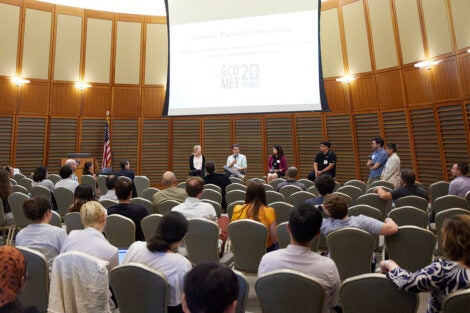September 14, 2023 – Over 100 current and former members of Harvard T.H. Chan School of Public Health’s Department of Molecular Metabolism gathered on September 7 to celebrate the 20th anniversary of the department’s founding, to reflect on the successes of the past two decades, and to look ahead to promising research in the field of metabolism.
Among those giving opening remarks at the event was Barry Bloom, Joan L. and Julius H. Jacobson Professor of Public Health, Emeritus, who was the dean of Harvard Chan School at the time the department was founded in 2003. Known as the Department of Genetics and Complex Diseases for 16 years, the department changed its name to the Department of Molecular Metabolism in 2019.
“The reason we need basic science in a school of public health is [that] much of population research results in associations, and there is a critical need to establish mechanisms and causality,” Bloom said. “That has been nowhere more important than understanding the critical noncommunicable diseases of diabetes and metabolic diseases, cancer, neurological diseases, and … the role of genes in causing or modifying them.”
Brendan Manning, professor of molecular metabolism and acting chair of the department, noted that back in 2003, the field of cancer metabolism did not exist yet. Since then, there has been an explosion of research in the area, highlighting the importance of the department’s creation.
“This to me took really tremendous forethought—that all these processes, these noncommunicable diseases, all had some underpinning that linked them,” Manning said.
Additional opening remarks were delivered by Gökhan Hotamışlıgil, James Stevens Simmons Professor of Genetics and Metabolism and founding department chair, and Walter Willett, professor of epidemiology and nutrition, who played a key role in shaping the department.
The symposium, which was held at Harvard Medical School’s New Research Building, featured research talks from former graduate students and postdoctoral fellows who now hold faculty positions around the U.S. They shared their recent advances across a wide range of topics, such as the role that metabolism plays in cancer, diabetes, and aging. The event also included alumni panel discussions and a poster session for current trainees.
One of the alumni panels focused on the future of metabolism research. According to the speakers, researchers have made strides toward uncovering the biological processes that contribute to noncommunicable diseases—however, much work remains to be done. For example, investigating the cellular mechanisms underlying type 2 diabetes has led to the development of a type of drug called glucagon-like peptide-1 receptor agonists, which are used to lower patients’ blood sugar levels.
“These new therapeutic advances are revolutionary, and that’s very exciting,” said Shannon Reilly, an assistant professor of metabolic health in medicine at Cornell University. “I don’t think we should all go home yet. There’s still a lot to do and to understand about exactly how these are working.”
Christian Dibble, an assistant professor at Harvard Medical School who runs a metabolism lab at Beth Israel Deaconess Medical Center, added that taking a broader view of metabolism research could have a major impact.
“I don’t always think about metabolism through the lens of disease. What I’m trying to do is create a blueprint of the cell from signaling pathways, metabolism, everything—how a cell works,” he said. “We’re far from having that complete blueprint—but once you do, then you’re going to be able to really apply that to all the different problems of medicine, not just metabolic diseases.”
– Jay Lau
Photo: Kent Dayton
